Hey, there cat lovers! If you’ve recently dewormed your feline friend, you might be wondering what to expect next.
Will your kitty be back to its normal self in no time, or will there be some lingering side effects? Don’t worry, we’ve got you covered.
In this article, we’ll go over the typical symptoms you can expect after deworming a cat, as well as some tips for keeping your kitty comfortable and happy during the recovery process.
So grab a cozy spot and let’s dive in!
Key Takeaways
- Cats may experience sensitive stomachs, increased salivation, diarrhea, and loss/lack of appetite as side effects of deworming medications
- Cats may become lethargic after deworming due to side effects of the medication, dehydration, digestive discomfort, or underlying health issues
- If symptoms persist or the cat becomes dehydrated, contact a veterinarian
- It is important to follow the dosage instructions and administration guidelines for the specific deworming medication being used
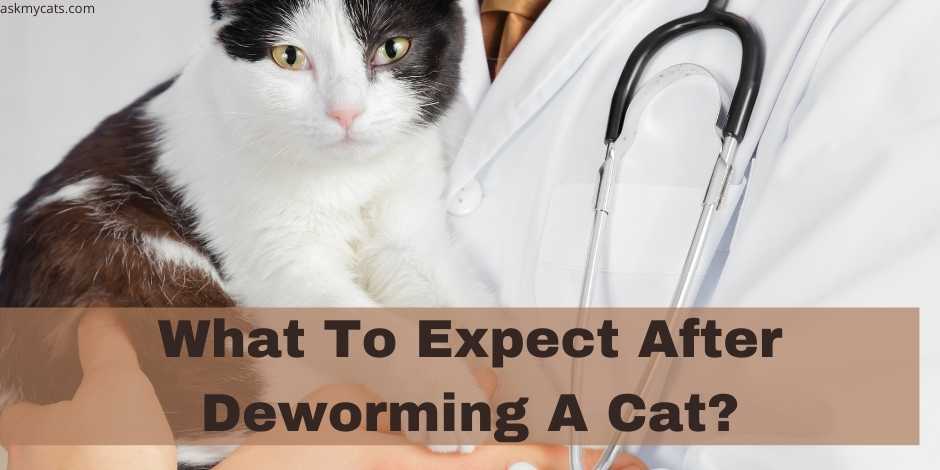

Give Your Cat the Perfect Day
Get the Free Ebook!
What To Expect After Deworming A Cat
| What to Expect | Explanation |
|---|---|
| Some cats may vomit after treatment | This is a common side effect of deworming medication, especially if the cat has a lot of worms. It is usually not a cause for concern unless it persists. |
| Improved appetite | After getting rid of worms, cats may have an improved appetite and may start eating more. |
| More energy | Cats may also have more energy after getting rid of worms, as they are no longer expending energy on fighting off the worms. |
| Weight gain | Improved appetite and increased energy levels may lead to weight gain. Monitor your cat’s weight and adjust its food intake accordingly. |
| Fewer bowel movements | Deworming can cause a temporary decrease in bowel movements, but this should resolve within a few days. |
It’s important to follow the instructions provided by your veterinarian when administering deworming medication to your cat.
It’s also a good idea to follow up with your veterinarian to make sure the treatment was successful in eliminating the worms.
Possible Side Effects Of Cat Dewormer
Some cats might feel temporarily ill after deworming, but there is nothing to worry about as it is normal.
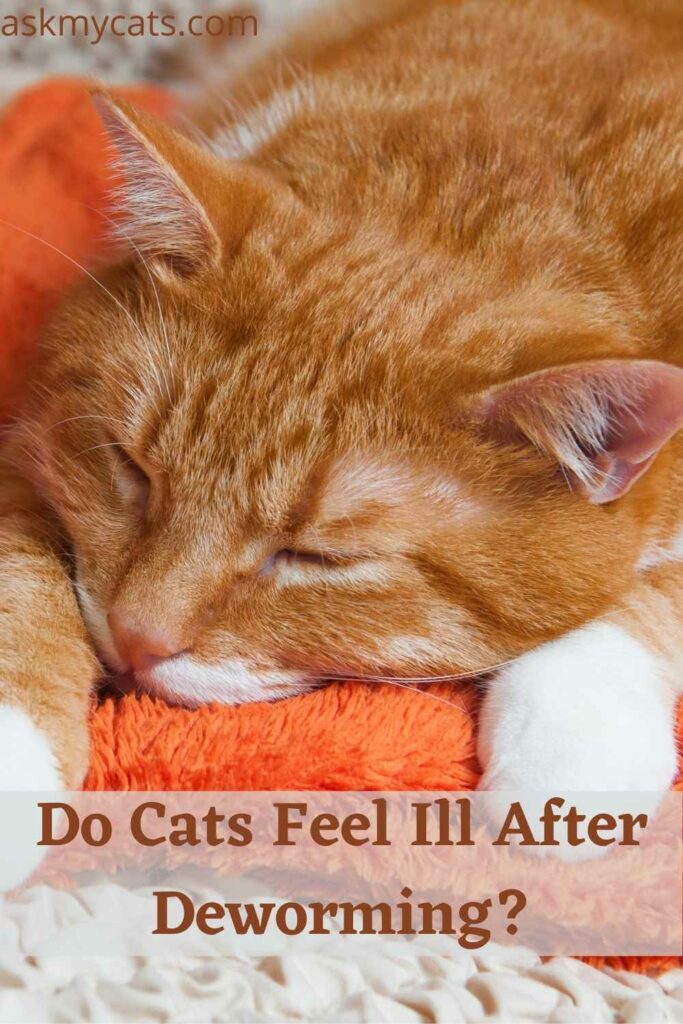
While dewormers are generally safe and effective, it is important to be aware of the possible side effects that may occur after administering these medications.
Some common side effects of cat dewormers include:
1. Sensitive Stomach
During the deworming procedure, a lot happens in your cat’s stomach.
Due to the intensity of the drug and the parasites traveling through their digestive tract, some cats vomit during deworming.
You should seek veterinary help if your cat vomits within an hour of taking the medication.
Vomiting can induce dehydration, which may necessitate your cat’s admission to a veterinarian facility for fluids and other treatments.
2. Increased Salivation
Increased salivation in cats following a deworming treatment is a common side effect that lasts typically two to three days, like the others.
If your cat is frothing at the mouth rather than salivating, you should contact your veterinarian immediately. Your cat could be suffering from a more dangerous illness, such as rabies.
3. Diarrhea
Cats frequently get diarrhea after receiving deworming drugs. Worms are also commonly found in the feces of cats. You may notice bloody stools.
These signs and symptoms typically only last two to three days.
If the symptoms persist, your veterinarian may prescribe other anti-inflammatory drugs such as metronidazole or prednisone to help manage the inflammation caused by inflammatory bowel disease.
4. Loss/Lack Of Appetite
Deworming drugs are extremely potent. After all, the purpose is to get the parasites out of your cat’s system. As a result, it’s not uncommon if your cat loses its appetite while the drug is working its way through its system.
This is usually a transitory side effect that only lasts a few days. If your cat’s appetite doesn’t improve after three to four days, seek assistance from your veterinarian. Your cat may require medicine to get back on track.
You might also like to read about how much is it to deworm a cat
Cat Lethargic After Deworming
It is not uncommon for cats to become lethargic after undergoing a deworming treatment.
There are a few possible reasons why a cat may be lethargic after deworming:
Side effects of the medication: Some deworming medications can cause side effects such as vomiting, diarrhea, and lack of energy in cats. These side effects may cause your cat to be lethargic as they recover from the treatment.
Dehydration: Deworming can sometimes cause dehydration, which can lead to lethargy in cats. It’s important to make sure your cat has access to plenty of fresh water after deworming to help prevent dehydration.
Digestive discomfort: Cats may be lethargic after deworming due to digestive discomfort caused by the treatment. This can be eased by feeding your cat a light, easy-to-digest diet and providing a quiet, comfortable place to rest.
Other underlying health issues: In some cases, a cat’s lethargy after deworming may be due to an underlying health issue, such as an infection or a chronic illness. If you have concerns about your cat’s health after deworming, it’s important to consult with your veterinarian for further evaluation.
Some General Things To Expect After Deworming A Cat
| Possible Outcome | Explanation |
|---|---|
| No change in appetite or behavior | This is the most common outcome and is not cause for concern. |
| Increased appetite | This is normal and may be due to the cat’s body expending energy to eliminate the worms. |
| Decreased appetite | This may be due to stomach upset or other side effects from the medication. If appetite decreases or the cat becomes lethargic, contact your veterinarian. |
| Vomiting or diarrhea | These side effects are usually mild and resolve within a day or two. If the vomiting or diarrhea persists or the cat becomes dehydrated, contact your veterinarian. |
| Passing worms in the feces | This is normal and is a good sign that the medication is working. If you notice a significant increase in the number of worms passed or if the cat continues to have diarrhea or vomiting after treatment, contact your veterinarian. |
How Long Do Deworming Side Effects Last?
The side effects of deworming could last for about 24 hours to 2 days. If it lasts more than that, then an appointment with the vet is advised.
The length of time that deworming side effects last can vary depending on the specific medication used, the severity of the infestation, and the individual cat.
In general, most deworming side effects are temporary and resolve on their own within a few days.
Consult your veterinarian if you feel your cat is suffering from these adverse effects.
Expert Quote
“Most cats experience no side effects after being dewormed. However, some cats may vomit or have diarrhea after being dewormed. These side effects should resolve within a day or two and are not cause for concern.”
Dr. Karen Becker, DVM
Do Cats Poop Out Worms After Being Dewormed?
Yes, cats do poop out worms after being dewormed. Alive or dead worms could be found In your cat’s poop.
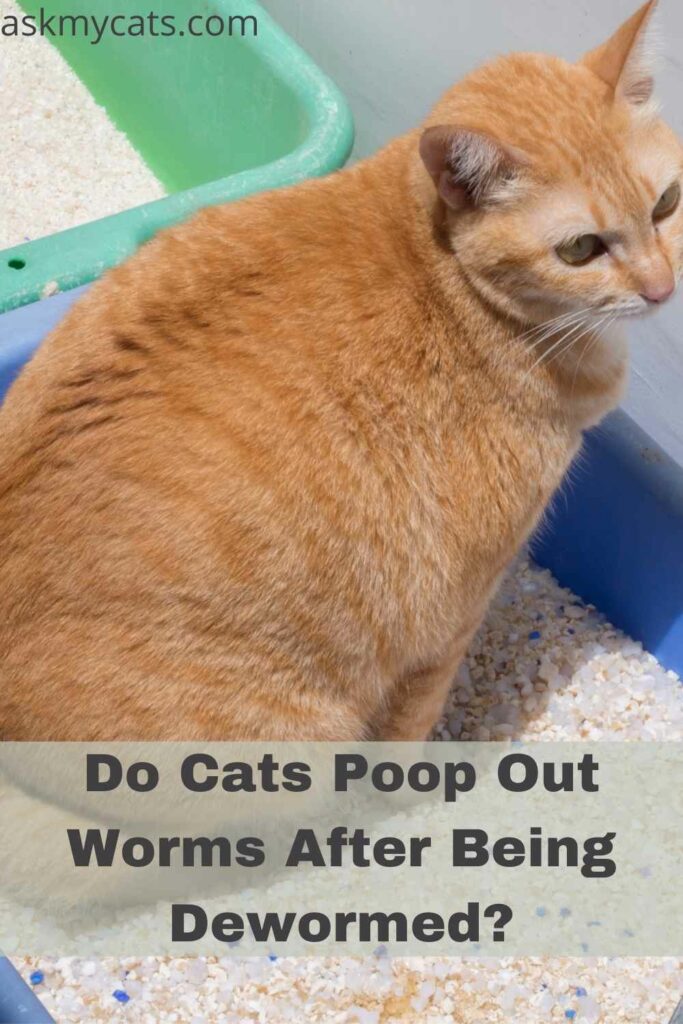
It is possible for a cat to pass worms in its stool after being dewormed. This can occur for a few reasons:
- The deworming medication takes time to work: Most deworming medications work by killing the adult worms that are living in the cat’s intestine. However, it can take some time for the medication to fully clear the worms from the cat’s system. During this time, it is possible for the cat to pass some of the dead worms in its stool.
- The cat may have already laid eggs: Some types of worms, such as tapeworms, can lay eggs that are passed in the feces. These eggs can hatch and develop into worms inside the intestine, or they can be ingested by another animal. Even if the adult worms are killed by deworming medication, it is possible for the cat to pass eggs that were laid before the treatment.
- The cat may have re-infected itself: If the cat has access to areas where infected feces are present, it is possible for the cat to re-infect itself with worms. This can occur even if the cat has been dewormed, as the deworming medication may not provide protection against new infections.
Overall, it is normal for a cat to pass worms or eggs in its stool after being dewormed.
However, if you are concerned about your cat’s health or if the cat continues to pass worms several weeks after being treated, it is important to consult a veterinarian.
Expert Quote
“It is common for cats to pass worms in their stool after being dewormed. This is because the medication takes time to clear the worms from the intestine, and it is possible for the cat to pass some of the dead worms in its stool.
It is also possible for the cat to pass eggs that were laid before the treatment.”
Dr. Emily Hernandez, DVM
Also, check out about my cat has worms how do I clean my house
Do Cats Get Diarrhea After Deworming?
Your cat can get diarrhea after deworming, and it is pretty common, as it is a spontaneous response of your cat’s stomach.
There are several reasons why a cat may experience diarrhea after deworming.
One reason is that the deworming medication can cause irritation to the digestive system, leading to diarrhea as a result.
Another reason is that the worms themselves can cause irritation and inflammation in the intestines, leading to diarrhea as they are being expelled from the body.
It is important to note that diarrhea after deworming is not always a cause for concern, as it is a common and expected side effect.
However, if diarrhea persists or is severe, it is important to consult with a veterinarian. They can determine if the diarrhea is a result of the deworming process or if there is another underlying cause that needs to be addressed.
How long will a cat have diarrhea after deworming?
It is not uncommon for cats to experience diarrhea after deworming. However, the duration of diarrhea will depend on a number of factors, including the type of deworming medication used and the severity of the infestation.
In most cases, diarrhea should resolve within a few days after deworming.
If your cat’s diarrhea persists or becomes more severe after deworming, it’s important to contact your veterinarian for further evaluation.
Must Read: Home Remedies For Worms in Cat!
Common Deworming Medications For Cats and Their Potential Side Effects
| Medication | Potential Side Effects |
|---|---|
| Pyrantel | Rarely causes side effects. May cause stomach upset, vomiting, or diarrhea. |
| Praziquantel | Rarely causes side effects. May cause stomach upset, vomiting, or diarrhea. |
| Milbemycin oxime | Rarely causes side effects. May cause stomach upset, vomiting, or diarrhea. |
| Emodepside and praziquantel | Rarely causes side effects. May cause stomach upset, vomiting, or diarrhea. |
Can I Feed My Cat After Deworming?
Yes, you can surely feed your cat after deworming; make sure that the first initial diet should be less than the usual meal to confirm there are no side effects.
After deworming, it is important to continue feeding your cat a balanced diet to help them regain their strength and recover from the effects of the worms.
It is also important to follow the specific feeding instructions provided by the veterinarian or on the medication label. These may include recommendations for the type and amount of food to be fed and any necessary dietary restrictions.
Also, check out do worms cause gas in cats
Can I Bathe My Cat After Deworming?
Whether you can bathe your cat or not after deworming depends upon the type of dewormer used, whether internal or external.
Bathing your cat will, in theory, be determined by the type of deworming you use and the cat’s age.
Bathing the kitten is strictly prohibited if it is the first deworming and you have not yet vaccinated it because you will most likely become ill; you will not be able to do it immediately after the vaccination is placed, for the same reason.
Interesting Read: Can You Vaccinate A Pregnant Cat?
When it comes to an adult cat, you must consider the type of product you are using. There is no problem bathing your cat generally if it is a routine internal deworming performed according to your veterinarian’s recommendations.
When It is an external deworming, the procedure changes a bit. Being these products are applied to the skin and coat, the best thing is that if it is necessary to bathe your cat, wait three days for the effects of the dewormer to have penetrated.
The most advisable thing to do would be to wash your cat before applying the dewormer. Your cat will already be clean and will not need another bath anytime soon.
our Recommendation
Protect your feline friend from fleas and ticks with our top-rated cat flea collar. Check out our recommended cat flea collar which works for all weights and sizes.
Why Does My Cat Still Have Worms After Deworming?
Your cat might still have worms after deworming as dewormers take 2-4 days to take effect, or sometimes a second dose is also needed.
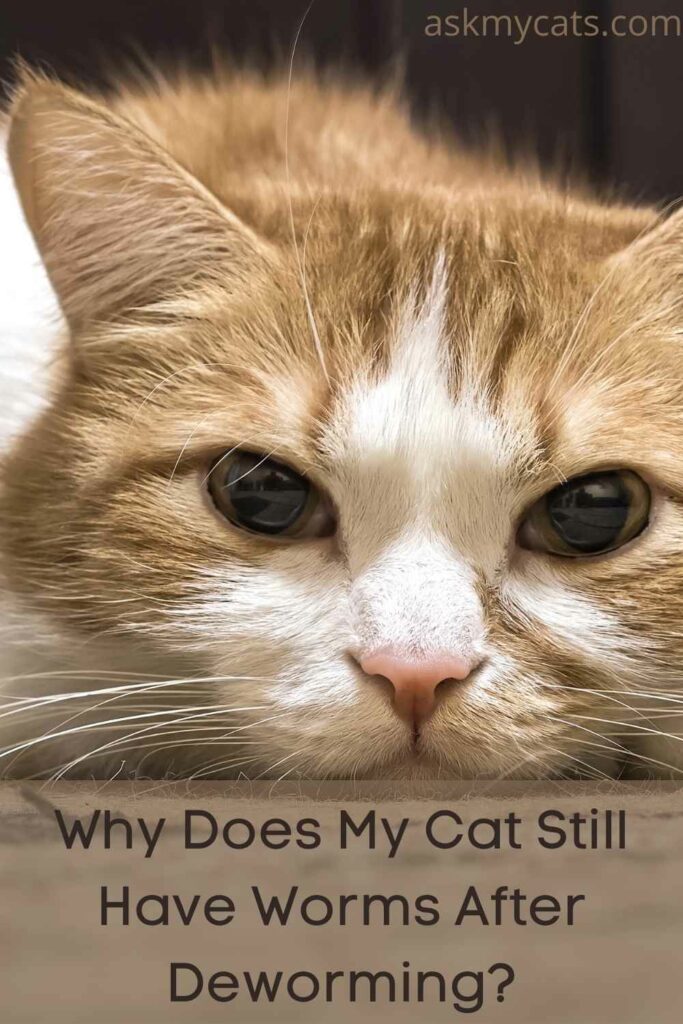
The worms will usually be gone in 2 to 3 weeks after you give your cat a dewormer. It may need a second deworming a few weeks later to get rid of all the worms.
Cats are noted for their impeccable hygiene. They can reinfect themselves with parasites as a result of this.
When your cat has parasite eggs in its rectum, it may lick it.
This causes them to reinfect themselves, necessitating the application of a new dewormer.
Most dewormers will be requiring an initial period of only 2-3 weeks to eliminate worms; however, some treatments will also need a double dosage to eradicate the second wave of parasites.
Aside from roundworms and tapeworms- other parasitic worms can pose a more severe threat.
Heartworms, for example, can only be treated with prescription medication. Just like with non-prescription drugs, you should ask your veterinarian if they have any specific recommendations for your pet when selecting prescription dewormers.
You might also like to read about whether can i get worms from my cat sleeping in my bed
How Soon Can I Deworm My Cat Again?
Deworming Schedule
Kitten
If you’ve recently acquired a young kitten who has never been wormed, or if you don’t know if or when they were last wormed, you should treat them right away.
Then, until they’re eight weeks old, you should deworm them every two weeks. After that, you can worm them once a month until they’re six months old, then once every one to three months.
Adult Cats
Adult cats should be wormed at least once every three months, or four times a year, once for each season.
Pregnant Cats
These cats should be wormed when the pregnancy is complete and again during nursing with the kittens’ first worming treatment.
Check with your veterinarian before deworming to see which products are safe to use on pregnant or nursing cats.
Hunting Cats
Cats who enjoy hunting are much more likely to contract worms by eating infected rodents such as mice. As a result, your veterinarian is expected to recommend worming once a month.
Our Recommendation
Don’t let fleas ruin your cat’s comfort! Protect them with our recommended flea drops. Click here to learn more. Check out our recommended cat flea drops which is trusted by veterinarians for nearly 20 years.
Cat Died After Deworming
It is very rare for a cat to die as a result of deworming treatment.
However, there are a few possible explanations for why this may occur:
Allergic reaction:
In some rare cases, cats may have an allergic reaction to the deworming medication, which can be serious or even life-threatening.
Symptoms of an allergic reaction may include difficulty breathing, swelling of the face or paws, and vomiting.
If your cat experiences any of these symptoms after deworming, it’s important to seek immediate veterinary care.
Overdose:
If a cat is given an overdose of deworming medication, it can be toxic and potentially fatal. It’s important to follow your veterinarian’s instructions carefully when administering deworming medication to your cat.
Pre-existing health conditions:
If a cat has a pre-existing health condition that weakens its immune system, it may be more prone to complications from a deworming treatment.
It’s important to let your veterinarian know about any pre-existing health conditions your cat has before administering a deworming treatment.
If your cat has died after deworming, it’s important to consult with your veterinarian to determine the cause and whether there were any underlying health issues that may have contributed to your cat’s death.
It’s also important to follow your veterinarian’s instructions carefully when administering deworming medication to your cat to reduce the risk of complications.
Interesting Read: Should I Quarantine My Cat With Tapeworms?
Post-deworming Care
1. Monitoring for improvement in symptoms:
After a deworming treatment, it’s important to monitor your pet for any improvements in its symptoms. This may include things like increased energy levels, improved appetite, and fewer digestive issues.
If you notice any improvements, this can be an indication that the deworming treatment was successful in removing the worms from your pet’s system.
2. Disposal of feces to prevent re-infection:
One of the main ways that pets can become re-infected with worms is by coming into contact with contaminated feces. To prevent this, it’s important to properly dispose of your pet’s feces, either by burying it or placing it in a sealed bag and throwing it in the trash.
3. Follow-up deworming treatments as recommended by a veterinarian:
In some cases, a single deworming treatment may not be enough to completely eliminate all of the worms from your pet’s system.
In these cases, your veterinarian may recommend follow-up deworming treatments to ensure that the worms are completely eliminated.
It’s important to follow your veterinarian’s recommendations in order to fully protect your pet’s health.
Frequently Asked Question
Can I deworm my cat myself?
Yes, you can deworm your cat on your own. Over-the-counter dewormers do not treat all parasites that your cat may have, so you may need to acquire them from your veterinarian. You should be able to give this to your cat without difficulty. It will be a liquid or a tablet that you will provide to your cat orally. Some dewormers, like many flea and tick treatments for cats, can be used topically. It also makes giving it to your cat a lot easier.
Should I clean my whole house after deworming my cat?
Cleaning the entire house after deworming a cat is highly recommended as this will significantly lower the chances of your cat getting reinfected by the worms.
Is it safe to deworm a cat?
Keeping aside the side effects, it is safe to deworm a cat, which must be done to ensure its well-being.
Final Words
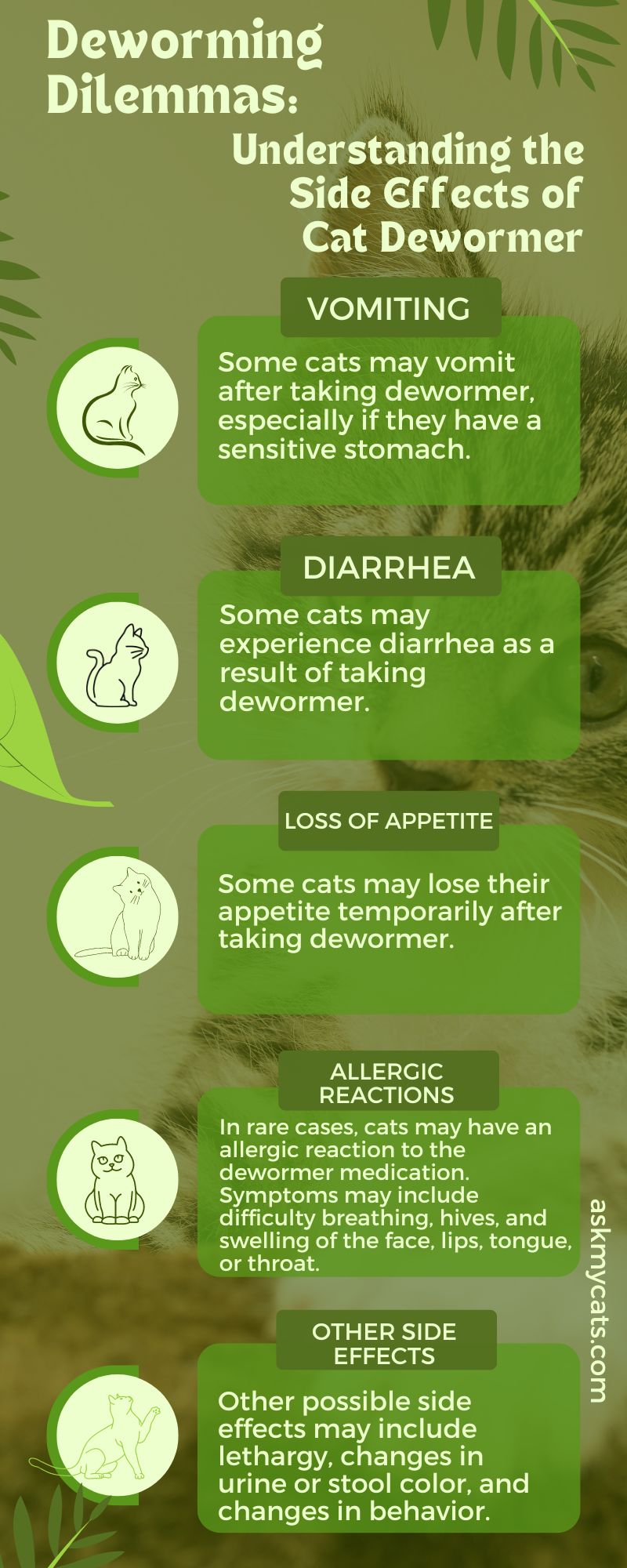
Deworming your cat is an essential process to keep them safe and happy throughout their lives.
Because your veterinarian is a member of your cat’s healthcare team, begin the dialogue now to ensure that your little furball remains pest-free.
For any other questions and queries, feel free to ask us in the comments.

My cat has vomited and a worm came out though it has already been dewormed.is it serious? Worm didn’t come out through poop but it came out though vomit.why??
I think you need to consult with your vet for expert advice
Hi just took my cat to the vet to get dewormerd vet said not to feed him but my cat wants to eat what do I do
Follow the vet’s instructions. They would know what’s best for your cat.